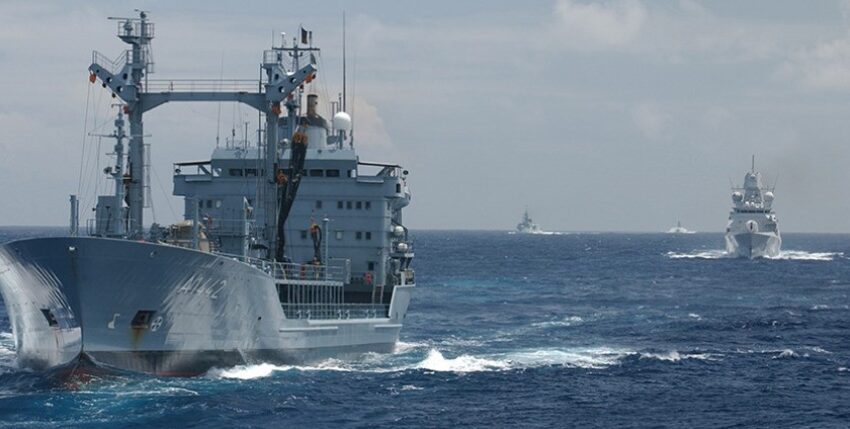The war in Ukraine and the 100 billion package: the turnaround proclaimed by Chancellor Scholz has also left its mark on the navy. In an interview with marineforum, the Inspector of the Navy, Vice Admiral Jan C. Kaak, explains the changed situation for his branch of the armed forces.
The war in Ukraine has been going on for over six months. What does this mean in concrete terms for the German Navy?
When I ordered the Navy on 24 February to "Everything that floats, get out", it was with a sense of "Not during our watch!" And this is exactly what the men and women of the navy - on land, at sea and in the air - have impressively emphasised in recent weeks. Up to 28 units have been put to sea in a very short space of time, the permanent NATO task forces have been reinforced and ships, boats and aircraft have been deployed to the eastern Baltic Sea. That's an incredible number for our small navy. And that despite the shortage of personnel and equipment that plagues us all. This was and is a moving attitude on the part of our people in the navy, who have thus emphasised that we stand together for NATO's promise of "one for all and all for one" - quickly and effectively. And all this has not gone unnoticed - neither by our friends nor by others.
But let's also be honest - we cannot sustain this number of units, this show of strength, indefinitely. The focus here was not on the level of training of our units, but on a rapid response - a visible sign of solidarity and determination to our allies and partners, especially those who feel particularly threatened due to their geographical proximity to Russia.
That is why we have created a new instrument from scratch with our "Baltic Guard" Concept of Operation, which enables us to coordinate activities primarily in the Baltic Sea in terms of space and time and to strengthen joint exercise activities. The operational concept is distributed up to NATO level in the Allied Maritime Command so that our partners in the Baltic Sea can also participate. Even the US Navy has actively participated. In the meantime, NATO has declared the Baltic Guard to be one of the enhanced vigilant activities.
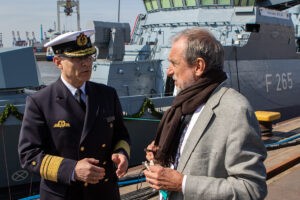
Does the 100 billion package also open up an opportunity for the navy? What are your expectations?
In order to be able to continue to act as a reliable instrument of policy in the future, or, as we put it in the Naval Compass, as an instrument and arm of our state, we must "maintain and ... strengthen". Ultimately, of course, it is about being better together with friends than potential opponents. Only then does the principle of deterrence work - if the outcome of a possible confrontation remains uncertain for the enemy.
This "being better than others together with friends" is our aspiration. To achieve this, however, the German Navy must be able to do one thing above all: function. We need our ships and aircraft to be operational now - not in ten years' time, and we must now bring the projects initiated in recent years to a successful conclusion. The announcement of a comprehensive reform of structures, processes and procedures as well as the expected sustainable financial support for the Bundeswehr makes me cautiously optimistic that we can achieve substantial improvements for the navy. Please forgive my North German reticence, but the truth is that we are delighted!
However, there is one thing these 100 billion are not - a panacea for our problems. That's why we need to take two consistent steps. First of all, we need to strengthen our existing fleet. To this end, we have also compiled and reported a package of many small projects and requirements within a short space of time. This is where the opportunity for short-term effects lies. To put it very simply, my seven priorities are as follows: Ammunition, ammunition, ammunition, spare parts, spare parts, spare parts - and command and control capability. A huge opportunity lies in the construction of the new naval arsenal in Warnemünde.
This substantial strengthening of our maintenance capabilities will enable a turnaround in the Navy's long-term operational capability. It is precisely this turning point that the German Navy needs as quickly as possible. With the purchase of the former MV shipyard site, the start has now been made. Now it is important to get the new outpost up and running quickly.
But we must not lose sight of the modernisation of our fleet either - and we will not do so now. We made early preparations in this area and know exactly what we need to do with the naval component in order to keep up with the times and position ourselves for the future.
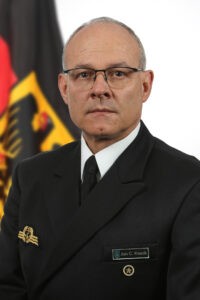
Important steps such as the start of construction of the 212CD submarines, new fleet service boats and P-8 Poseidon maritime reconnaissance aircraft were already initiated before the "turning point". Now we could invest in further strengthening our submarine hunting and strike capabilities, as well as finally realising small combat boats for the naval special forces command and the naval battalion. I see light at the end of the tunnel in the area of mine defence as well as in the replacement of tenders, auxiliary vessels and tankers. And definitely long overdue: improving our command and control capabilities - from German Mission Network 2 and 4 to Satcom and upgrading the on-board networks. At the same time, we want to start making greater use of unmanned systems under and above water and in the air.
You already travelled with the navy when you took office as commander. What conclusions do you draw for missions, NATO commitments and the navy's contribution in the Baltic Sea?
That is correct. The escalation of the security situation was already apparent at the time. Today, our fears are a bitter reality. We must react to this and make the navy "fit for the future".
But here too, success will depend crucially on our will and our willingness to follow this path courageously and constructively. The navy is going all in here, and we are currently turning over every stone to make ourselves better and faster. But it won't work without external help: The keywords are making deployments more flexible, complying with certification standards as the basis for sending our men and women on deployments responsibly and significantly improving the maintenance system of our units.
This requires a reconsideration of deployments in the Mediterranean and, as a result, their flexibilisation or termination. It also means accepting only the "combat-ready" certification level as the basis for the deployment of our units. The Minister and the Inspector General have given me the green light for this. In addition, the future of deployments is currently being discussed in the political arena.
With regard to our contribution to NATO, the Commander Allied Maritime Command asked me how we want to position ourselves in the future. My answer was simple: "The German Navy will stay regionally rooted and globally committed!" Regionally rooted - globally committed!
Our main area of operation remains the northern flank with the North Sea, the North Norwegian Sea and the Atlantic - with a special focus on the Baltic Sea. We are preparing for this in terms of equipment, training, leadership and participation in exercises. Strengthening the NATO task forces, participating in high-quality exercises and protecting the carrier strike groups are in our interests.
A look into the Baltic Sea shows that this is now unfortunately once again a focal point on NATO's northern flank - heavily militarised and with the constant potential for NATO and EU forces as well as Russia to clash. At the same time, the accession of Finland and Sweden to NATO, which we all very much welcome, is a welcome strategic game changer.
Nevertheless, the German Navy remains no small navy in this region. We gladly accept the responsibility that arises from this. Together with our partners in the Baltic Sea, we are currently strengthening our many years of successful cooperation, also to make it clear to Mr Putin: "Don't try it with us! We won't allow it!" As a result of these activities, we are seeing "normative behaviour" on the other side - also and precisely because we are vigilant.
To consolidate our joint activities, the Inspector General recently offered NATO that the German Navy would set up a Regional Maritime Headquarters for the Baltic in Rostock for our home region - we are prepared to take on this coordination and leadership role.
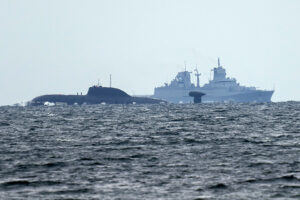
Finland and Sweden are about to join NATO. How will the navy react and adapt to the consequences?
As I said before: Finland and Sweden joining NATO is a strategic game changer. Friends become allies. What a story! At this point, I would like to take up the cudgels for friendships and networks. All the inspectors of the Baltic Sea countries have known each other personally for years and have worked together to promote Baltic Sea cooperation. So it's not surprising that in this situation a simple phone call is enough to bring us together and support each other. I am very moved by this.
Strategically, the accession of Finland and Sweden to NATO opens up completely new options with regard to the supply lines for the Baltic region. At the same time, it is now all the more in the interests of the Alliance to guarantee the freedom and security of the sea routes in and around the Baltic Sea. That's why I don't believe in the formulation that the Baltic Sea is now a NATO inland sea. That is highly questionable under international law. We are in favour of the rules-based order. Peaceful passage and freedom of navigation on the high seas are part of this order. This also applies to the Baltic Sea.
Deu Marfor is about to be certified and full operational capability is planned for 2025. What is important to you?
The maritime command staff Deu Marfor impressively demonstrated its initial capability as recently as May. We will be reporting this to NATO very soon. This brings us a big step closer to our goal of certification and thus full operational capability at the right time.
As the German Navy, we want to take responsibility - in the Alliance and in the Baltic Sea region. We have benefited from NATO's promise for decades. Now is the time to give back - above all to our friends in the Baltic and in Poland. We are establishing the aforementioned Regional Maritime Headquaters for the Baltic from existing structures. Basically, this HQ will take over the tasks that the naval command currently performs as part of Baltic Guard: Coordinating the allied forces by space and time in the Baltic Sea region in order to ensure a comprehensive presence, vigilance and certainly also reconnaissance.
In addition, my intention for 2022 sets three priorities. The navy must become a powerful fighting force in preparation for what may come in the future. This means frontline first, focusing everything on national and alliance defence and demanding and promoting the will to win.
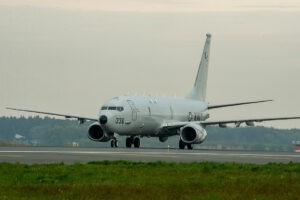
We want to be responsible partners. That is why we want our allies to know what we stand for and where we take responsibility. We want to make this clear in the strategic umbrella document, which we will of course derive from the Federal Government's National Security Strategy. I can already say - in a reserved North German way - that we have already made initial progress in both areas.
Ultimately, however, an intact family is the soul and heart of a navy. With the Marine Compass, we have given ourselves a vision of how we want to be: respectful, responsible, courageous and proactive. For me, these aspects are core elements of the necessary mutual trust that is the basis for successful cooperation and innovation, especially in a changing world.
What is particularly important to me? Some people might say: Why does something always have to happen before ... Because politics is about balancing interests and compromise. Today, here and now, the right political course is being set quickly. Now it's our turn.
I see the support and appreciation of the population, who have known for decades that they can rely on us, above all as an obligation to do everything we can to protect and defend our democracy, our values and our freedom.
Hans-Uwe Mergener

